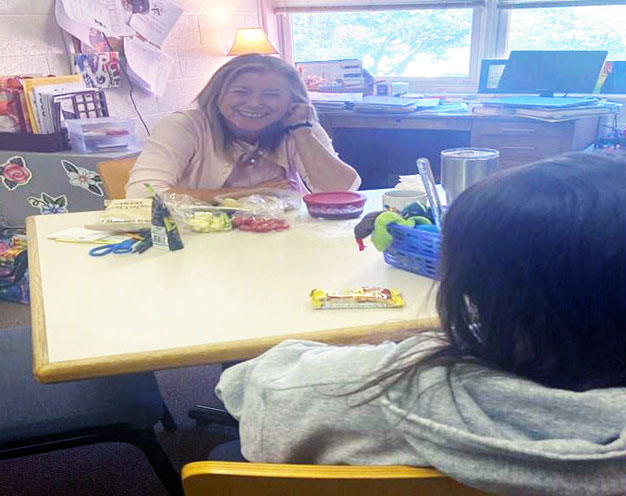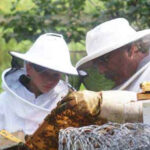
Counselor Stephanie Dobson at Notre Dame Catholic Schools in Burlington listens to a student.
By Barb Arland-Fye
The Catholic Messenger
Catholic schools in the Diocese of Davenport deal with mental health issues in different ways. Some have onsite resources to help students with coping skills while others do not. Here is a look at how Notre Dame Catholic Schools in Burlington, Assumption High School in Davenport and Regina Catholic Education Center in Iowa City encourage good mental health.
Notre Dame K-12
Students need time to slow down to share how they are doing in this continuing time of uncertainty, says Stephanie Dobson, the school counselor for Notre Dame. “Ask how things are going, what’s challenging?” Troubleshooting challenges such as laptops needing a charge, problems accessing homework assignments, or a family needing a hotspot to connect to the internet go a long way to alleviate anxiety, she said. “It’s one less worry they have.”
Dobson has been an educator for 41 years and after retiring from the public school system joined the Notre Dame staff this academic year. Her experience last year with students in grades four through eight at Fort Madison Middle School — during the height of COVID-19 — provided insights on how to move forward this year.
During the pandemic, “I’m finding that I need to be more intentional than I typically am; it’s helping them (students) figure out ways they can have control. There are so many things they can’t control,” she said. “Kids need creative outlets, ways to engage in self-expression and to think about places that bring them peace and calmness. It might be the chapel or a walk outside.”
Kids need to think about the good things that are going on in the midst of uncertainty, just being thankful for the birds, the sun shining and taking the time to stop and appreciate those good things, she said.
At Notre Dame, she works with students in grades kindergarten through 12 and is grateful for that opportunity. The kindergartners are learning self-regulation skills in a fun way. They participate in “personal space camp” and other social skill-building activities.
Some of the older students are learning about the culture of geese, discovering that when they work together they keep each other strong. “You move forward together, you bring people with you; it’s about servant leadership,” she said.
Anger management is also an important skill to address. She said kids love learning the science behind the bodily responses they experience regarding their emotions. Kids also need a safe place to land during the school day when they feel stressed out. In her room, she is available to listen and to help students figure out helpful coping skills.
Assumption High School
Since the pandemic began, “I’ve seen everything from higher numbers of panic attacks and upset stomachs to more unusual presentations of anxiety,” said Kelly Bush, Student Wellness director for Assumption High School. “For example, one student had a feeling of being ‘outside his own body’ when under stress. Anxiety can take many different forms — it tends to be a shape-shifter.”
Assumption has created several ways to try to encourage good mental health among students. “I provide classroom lessons on ‘Mental Health 101’ and work with our Students Against Destructive Decisions (S.A.D.D.) club members to create awareness campaigns for our larger student body on mental health and choosing positive coping skills,” Bush said. “I also see a lot of students for interpersonal one-on-one counseling. Many times, the school counselor is the first line of defense in mental health.”
Among the positive signs that she has witnessed as students navigate the school day in this time of uncertainty: “they are just so happy to be at school with their teachers and friends. The students realized that they need one another — and there’s a sense of gratitude for the simple things again — unpackaged food at lunch, smiles, hugs, time with grandparents, and even, dare I say, class time.”
Regina Jr./Sr. High
“While we don’t have teachers serve as school counselors in the traditional sense, our teachers do a wonderful job supporting our students through various ups and downs,” said Lynne Zoulek, Regina’s school counselor for grades 7-12.“Students have a range of concerns, stressors and factors that impact their mental health. For some, it’s simply the hesitancy in decision making when many factors continue to change outside of adolescents’ control.“Making connections between staff and students is one of the best ways the staff at Regina is helping to maintain good mental health practices. This year, our school has implemented a social and emotional learning component to our curriculum that aims to increase the connectedness students have to school.”
Her most common suggestions for coping skills to support students’ mental health wellness include gratefulness, journaling, prayerful meditation, deep-breathing techniques, exercise, talking with family and sharing their feelings with others.
“I am often struck with how resilient our students are. In some cases, student bounce back quicker than us adults. Since change is so frequent in adolescents’ lives, especially since the pandemic started, many students are finding positive ways to support one another and their family members. Their positivity then becomes contagious.”











